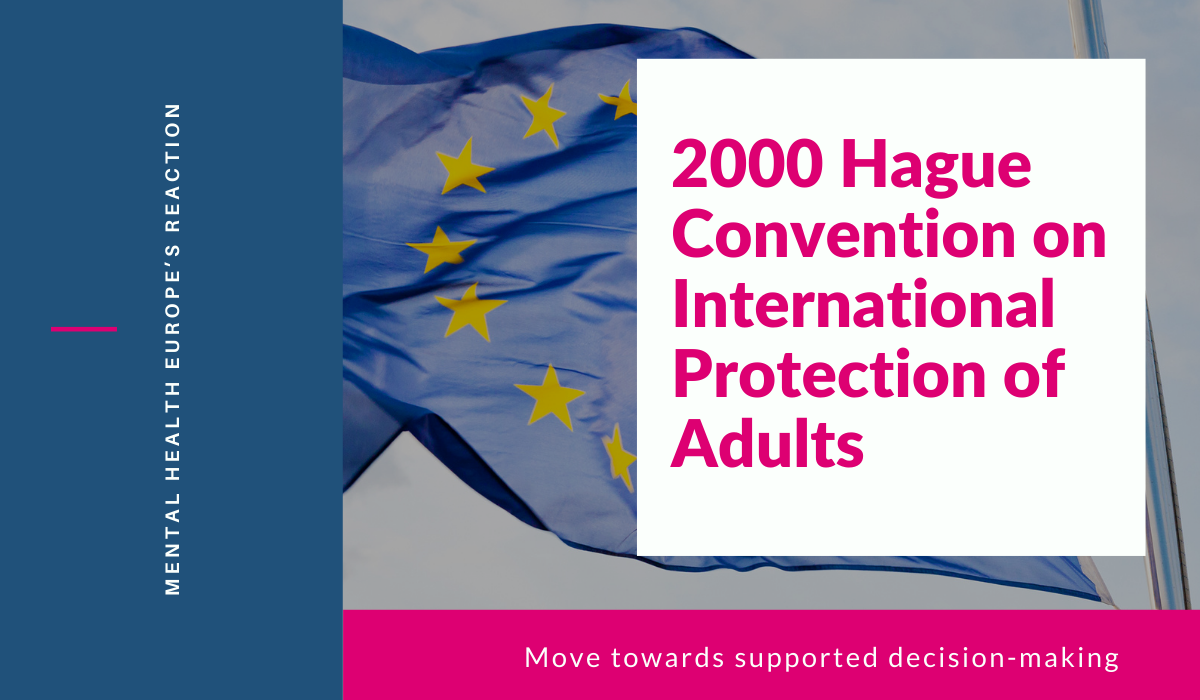No more legal barriers, let’s move towards supported decision making instead

Mental Health Europe (MHE) shares concern over the European Commission’s ambition to ratify 2000 Hague Convention on the International Protection of Adults. If ratified, the Convention risks cementing substituted decision-making for persons with disabilities in the EU.
Following the launch of the European Union (EU) Disability Rights Strategy 2021-2030, Mental Health Europe is concerned about the European Commission’s goal to encourage the EU Member States to ratify the 2000 Hague Convention on the International Protection of Adults.
After extensive preparations, including several rounds of discussion with civil society stakeholders, the European Commission launched the Disability Rights Strategy titled “Union of Equality – Strategy for the Rights of Persons with Disabilities 2021-2030“ on 3 March 2021. Following the EU’s ratification of the United Nations Convention on the Rights of Persons with Disabilities (UNCRPD), the strategy formulates central political commitments, objectives, and initiatives of the EU until 2030. In a previous statement, Mental Health Europe shared its delight over the strategy’s release and the close involvement of civil society stakeholders.
However, chapter 5 on equal access and non-discrimination of the Strategy foresees to “work with Member States to implement the 2000 Hague Convention on the international protection of vulnerable adults in line with the UNCRPD (…) by way of a study on the protection of vulnerable adults in cross-border situations, to pave the way for its ratification by all Member States“. So far, 10 EU Member States have ratified this Convention. The Commission, therefore, plans a proposal for a decision to assess the need for improved cooperation in the EU.
The 2000 Hague Convention was established by the Hague Conference on Private International Law and entered into force in 2009. The Convention regulates issues of jurisprudence, applicable law and others “in international situations of adults who, by reason of an impairment or insufficiency of their personal faculties, are not in a position to protect their interests”. The 2017 Explanatory Report further outlines that situations of placing adults in “a particular care institution“ or confining adults “who are a danger to third parties by reason of the mental disorders from which they suffer“ for reasons of both public safety and the adult are included in the scope of the Convention.
However, Article 12 of the UNCRPD underlines that persons with disabilities enjoy legal capacity on an equal basis with others in all aspects of life. Where needed, they should receive support through specific supported decision-making regimes. In 2020, the UN Special Rapporteur on the Rights of Persons with Disabilities, together with the UN Office of the High Commissioner on Human Rights (OHCHR) and the Special Envoy of the Secretary-General of the United Nations on Disability and Accessibility, released a guidance report on access to justice for persons with disabilities. It outlines ten principles, starting with the first necessity to recognise that all persons with disabilities have the full legal capacity and thus should not be denied access to justice on the basis of disability.
Enhancing the harmonisation of legal procedures in cross-border situations could be used to promote supported decision-making. However, the Convention takes an outdated approach to disability as the basis of its scope. The definitions of the Convention, as well as all EU Member States upholding some forms of substituted decision-making until today, question the Conference’s objective whether broad ratification would work towards the full respect of legal capacity for all persons with disabilities in the European Union, including persons with psychosocial disabilities. On 30 March 2021, the Portuguese Presidency hosted a Conference on the International Protection of Adults at which the Hague Convention was discussed at large. Unfortunately, no organisations representing persons with disabilities were included.
Mental Health Europe calls on the European Commission to reconsider its work towards the ratification of the 2000 Hague Convention. Instead, the Commission should concentrate all efforts towards supported decision-making across the EU, which allows persons with disabilities, including persons with psychosocial disabilities, to take responsibility for their own lives. Among others, supported decision-making is an essential aspect of the mental health recovery process. For this, the Commission should engage with civil society organisations, including organisations of persons with disabilities, to ensure full and meaningful participation at all levels of decision-making.
Stay connected
Get our latest news, personal stories, research articles, and job opportunities.

